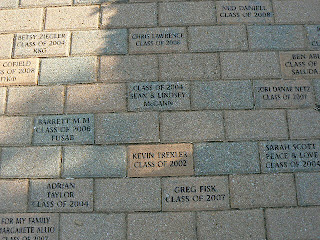Listening to the lecture ‘Building Sentences’ is like learning to write from scratch, bringing insight to areas I had never thought about, challenging long held assumptions and turning them inside out, relentlessly, challenging what one has learned so far, I sit and wonder if it’s too late to be a writer. The lecture series are sold over the Internet, mostly to retirees with nothing to do but watch television, but the lectures are well-crafted with good lecturers, a good way to make the middle class a truly educated class. The retirees or baby boomers are the largest market today, fueling untold products and services, especially television marketing, bringing enlightenment to the new coach potatoes with nothing left to do. So people find themselves benefiting, who would think that marketing good lectures to the general public except to mature audiences like retires with time on their hands. I am a baby boomer myself; narrowly joining the segment although one can still claim to be a member of the next generation, living in a sort of twilight zone between different age groups.
The lecture are quite long but I think the length is good to explain all the concepts without confusing the listeners, but oftentimes I fall asleep and had to replay the lecture, lost in the verbiage and thoughts flying past my head, the erudite professor tireless in his lectures, thinking that one should read the course guide to supplement the lecture or be lost in technical jargon. This type of lecture can only be possible as a DVD, where examples are explained clearly in visual language, where diagrams and writing samples effortlessly shown with digital efficiency, where otherwise writing on a blackboard would break the learning momentum. Reading and watching these DVDs and other such documentaries need synthesis and practice, helping one navigate everyday challenges, for example, one can improve one’s investment education and easily go in the market and purchase shares like any reckless investor in Wall Street or like an astute one like Warren Buffet. It is par for the course for most people here, but a slight challenge from someone who just moved 2 and half years ago without direct experience of the American way of life.
One was living in a sort of pseudo American culture back in Asia, enjoying Hollywood movies and music, emulating the lifestyle of ‘democracy’ and ‘freedom’ within the confines of an Eastern culture, often misguided, deluded by excess and indulgence, the personal id forever looking for gratification. But coming here felt like a homecoming, but after years of being blinded by cinematic illusions, one realizes that he is different, not part of the Anglo-Saxon ethos depicted onscreen, a distorted Asian identity looking for wholeness. So one reads and absorbs all sorts of stimuli, trying to blend in, transition seemingly seamless, a beneficiary of Western education after all, one has come home intellectually, the mind making connections to an imagined world. Living in foreign countries forces one to find himself, or be lost in a drive to assimilation, ramping up the input of sensations and thoughts as one tries to intermingle in a new milieu. Perhaps it is a mental reconstruction, finally inhabiting an imagined world, a fantasy really, suddenly faced with red-neck southern charm.
Listening to all these lectures are good like learning new tricks such as using cumulative sentences, so more tools and techniques can be pulled out of the bag when the need arises, the journeyman writer with his bag of tricks, similar to Hemingway’s boast of knowing some tricks like a boxing repertoire when facing an opponent, bobbing and weaving, finally striking a blow. The techniques seem artificial but a lot of writers use them, as shown in the many examples in the lectures, the tips become an essential armament in the writer’s kit, useful to deploy when the rhythm demands. But is it too late to learn? One does not teach an old dog new tricks, as the saying goes, but the feeling is exhilarating as something new is learned, possibly the highlight of my learning this year, in a year full of new discoveries and experiences. Perhaps the challenge is one of synthesis, as the mind is already filled to the brim, challenging one’s sanity with too much information, the brain constantly churning, resulting in sleepless nights, a remedy for meditation or alcohol depending on one’s inclination.
This explains the sudden charm of Japan, when suddenly one needs to watch Japanese movies and learn more about Kurosawa or Mifune, perhaps trying to recapture one’s Asianess, looking at the most developed Eastern nation for answers, thinking that the first dramatic struggle of an Asian nation shall provide a guide to one’s sanity. Thailand offers another example, a seductive mix of guile, without the bloodshed experienced by more martial neighbors, enticing the Westerners with drugs and women and entangling foreigners with their exotic embrace. Revolution, reconstruction and reform was the answer for countries like Japan, China and Indonesia while others like Malaysia, Singapore and the Philippines sought to help from their former oppressors, experiments that sometimes resulted in severe problems such as the Philippines where an entrenched oligopoly increased its grip. But despite the militarism, Japan moves with grace and dignity, flowing amidst ruins from nuclear, napalm and natural disasters, providing a guiding example to their Eastern neighbors.







































